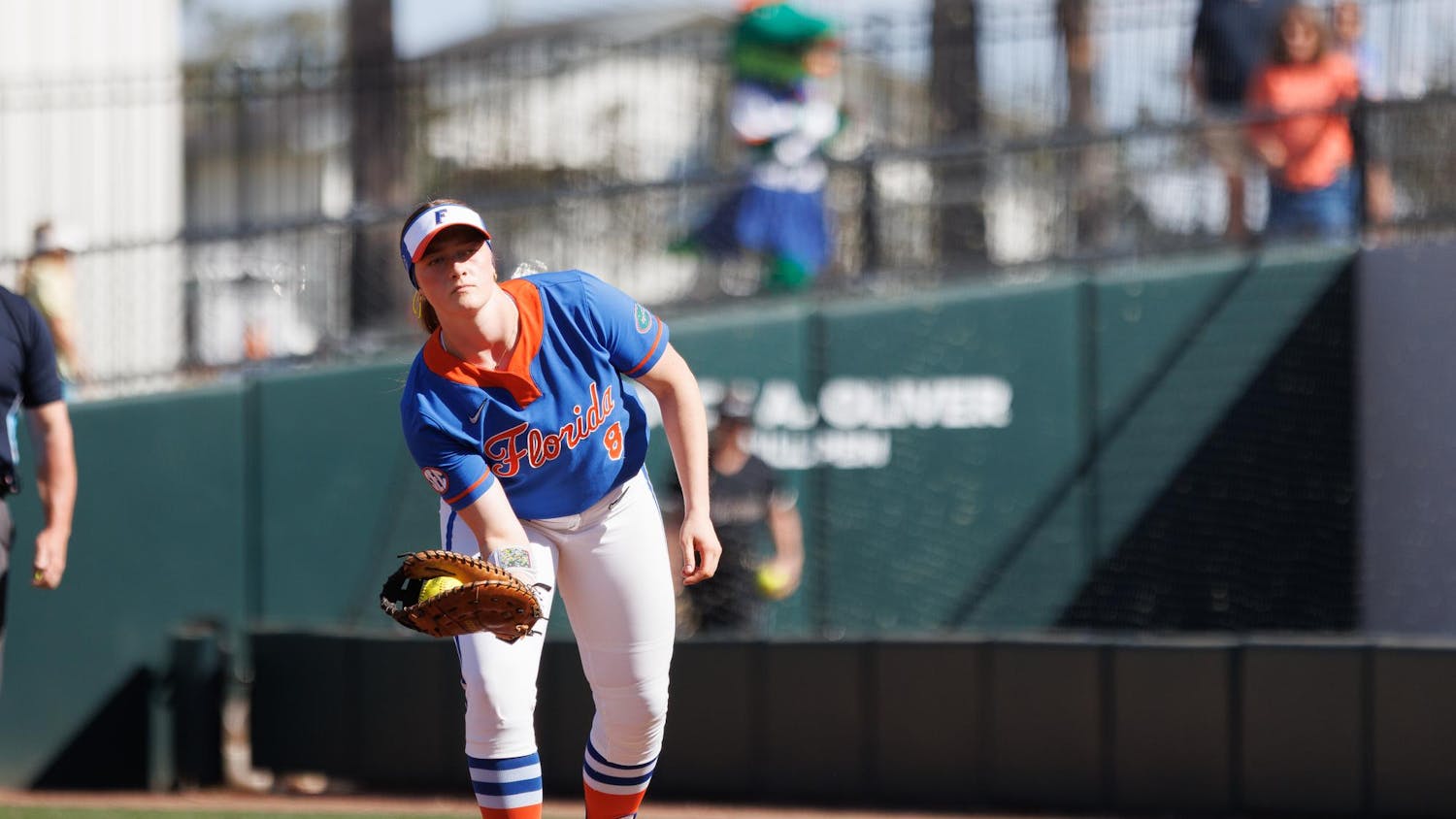For many children living in track and field-obsessed Jamaica, wearing the nation’s iconic green, black and gold kit on the global stage is their dream from the first time they lace up a pair of spikes.
In September, at just 22 years old, Gabby Matthews realized that dream. Despite earning her spot at the World Athletics Championships two months earlier, it didn’t sink in for the Florida senior until she touched down in Tokyo.
“It really hit me like a train,” Matthews said. “I always dreamed of it. You know when you really work toward something and it finally comes true. It’s like a feeling of relief. … That was how I felt.”
Matthews’ 2025 season started with two major changes: a new school and a new event.
Begrudgingly finding success in the hurdles
While competing for Ole Miss in 2024, Matthews was the SEC champion in the 400-meter hurdles and finished seventh at the NCAA Outdoor Championships, earning First-Team All-American honors. Despite all the success of her hurdling career, Matthews’ heart always belonged to a shorter, faster event.
From the earliest stages of her time on the track, Matthews showed potential in the short sprints. She ran 23.47 seconds over 200 meters at just 14 years old. Matthews continued collecting an impressive resume in the 100 and 200 meters, and the 100-meter hurdles, but injuries began to pile up.
Leading up to the 2022 edition of the ISSA Grace Kennedy Boys and Girls Championships — the most prestigious high school competition in Jamaica — Matthews’ injuries put her in a different trajectory, defining the next stage of her career.
Unable to sprint, Matthews opted to race the 100- and 400-meter hurdles. In the first round of the 400-meter hurdles, she shaved eight seconds off her personal best in the event with a 59.61-second clocking.
In spite of her best efforts to hide her hurdling prowess from her coaches, Matthews’ talent was undeniable. Her injury track record, combined with her aptitude away from the flat races, meant she entered the NCAA that fall as a pure hurdler.
Matthews quickly formed a bond with assistant coach Holland Sherrer when she got to Oxford, Mississippi, in the fall of 2022. Sherrer knew Matthews longed for short hurdles, but he had a responsibility to keep her healthy.
“We started training short hurdles, and she ended up getting hurt again,” Sherrer said. “I said, ‘Listen, if you can’t take care of yourself, we’re going to have to move up the 400-hurdles.’ ... The deal was if she did what she needed to do in the 400-hurdles, I would let her move back down to the short hurdles.”
An appearance in a 100-meter hurdles race was never in the cards for Matthews, but a sophomore season free from injury allowed for huge improvements in what was now her signature race and the occasional dalliance in the 200 meters.
“It would be a bargaining thing,” Matthews said. “So I guess that all we realized that I really want to run the [200].”
Even though Matthews was primarily focused on the 400-meter hurdles, her times in the half-lap distance were good enough to give Sherrer pause. After Matthews ran 22.98 seconds at the LSU Invitational on April 27, he had to wrestle with the decision of which event she would focus on in the national postseason.
Two weeks later, Matthews made Sherrer’s decision much easier by shaving nearly two seconds off her personal best in the 400-meter hurdles, running 55.12 seconds to win the SEC title.
An offseason of change
Following the 2024 NCAA season, Florida extended a return offer to Sherrer, where he was a volunteer assistant coach in 2017 and 2018. When he moved back to Gainesville, Matthews quickly followed suit.
“When I was at Ole Miss, I used to always see that the Gators had really good school spirit,” Matthews said. “I was excited to be a part of that. … You guys seemed like a pretty tight knit family over here.”
Along with the changes inherent in a new school, coaching staff, city and group of teammates, Matthews, Sherrer and Florida head coach Mike Holloway began discussing a transition away from the hurdles.
“Coach Sherrer and I had a long conversation about it,” Holloway said. “Because I trust him and I trust his judgement, we just went for it.”
Sherrer’s belief in Matthews’ potential didn’t stem just from her excellence in high school and in one-off collegiate races. She also was a consistent standout on the Rebels’ relays. During her sophomore year, Matthews ran the third leg for the Ole Miss 4x100-meter relay team, proving instrumental in their national championship.
Holloway praised her talent and athleticism.
“Anybody that watched her run that knew she could sprint,” he said.
There’s a stylistic difference between the rhythm that comes from the long hurdles and the aggressive, all-out nature of the short sprints. In her first races as a Gator, Matthews was thrown directly into the fire in the shortest event track and field offers: the 60-meter dash.
“I just always see them running the 60 and I’m like, ‘Oh my god, I don’t think I could do that,’” Matthews said. “There’s not even running time for it because as soon as you start, you’re done.”
The indoor season showed promise for the new chapter of Matthews’ career, after she ran a time of 7.26 seconds and finished third in the final at the Corky Classic on Jan. 17, but it also brought old struggles back to the forefront. She said she “tweaked” her groin prior to her season opener and then picked up a hamstring injury at the SEC Indoor Championships, which prevented her from competing individually.
“I was so fast, I know I was about to run something crazy,” Matthews said. “I feel like the reason why I got hurt was because I think my hamstring just couldn’t manage the speed that I had at the time.”
After two months off, her first race of the season was at the LSU Invitational. She crossed the finish line in a disappointing 23.68 seconds, but it was a mark on the board.
Another frustrating showing at the SEC Outdoor Championships meant Matthews barely qualified to the NCAA East Regional meet. With her back against the wall, Matthews delivered.
“I went into survival mode,” Matthews said. “It’s go time, I have no time to play. … I just transformed into this whole new person after I got back from SECs and I told myself, ‘I have to make it to nationals. I have no other choice but to make it to nationals.’”
Needing to place inside the top 12 finishers to punch her ticket to the national championships, Matthews ran a personal best of 22.87 seconds to finish eighth. Two weeks later, she produced another personal best of 22.59 seconds to seize the last spot into the national final.
In a new event, in a season where she faced her fair share of injuries, Matthews still managed to finish eighth at the NCAA Championships.
“This eighth place probably means more to me than if I got first place,” she said.
The chase for Team Jamaica
Just because the NCAA season was over didn’t mean Matthews could rest on her laurels yet. Her 22.59-second mark was the fourth-fastest by a Jamaican woman at that point in the season, meaning she was firmly in contention to make the national team for the World Championships.
“It was a goal from my last race last season, that Tokyo was next year and we’re gonna make the team,” Matthews said. “But I guess when I ran that race and I saw the time, I was like, ‘You know what, I can actually make this team. ... It’s right there.’”
The Jamaican Championships took place nearly a month before most other countries held their national championships, so Matthews only had two weeks from a hectic end to the collegiate season to regroup and refocus on the biggest meet of the year in Kingston, Jamaica. She easily made it out of the preliminary round before finishing second in the final with a time of 22.80 seconds.
This silver medal ensured the Jamaican federation would select Matthews for the World Championship team if she was qualified. But she needed one more strong performance to guarantee she had enough world ranking points to book a ticket to Tokyo. At the North American, Central American and Caribbean Championships on Aug. 16, a third-place finish in 23.02 did just that.
Matthews’ long season finally concluded inside Japan National Stadium on Sept. 17 in the 200-meter heats. The result wasn’t exactly what she was hoping for, but spending three weeks training alongside one of the world’s best collections of sprinters was invaluable, she said. Matthews even got some advice from arguably the best 200-meter runner ever, two-time World champion Shericka Jackson.
“She was just giving me some insight on what it takes to be at her level,” Matthews said. “I really appreciated her words. … She really talked for the younger ones coming up, and she always has kind words.”
Her experience in Tokyo brought about significant changes that Sherrer noticed immediately, even before Matthews dove back into her fall training cycle.
“But I think the thing I’ve seen biggest from her is a mindset shift, which is where it starts,” Sherrer said. “Hearing that she is thinking about things differently I think has been a breath of fresh air, because now we can really get to work.”
With the 2026 season around the corner, Matthews is prepared to take her experiences from this year, as well as her newfound comfort in short sprints, and channel a triumphant senior campaign. Matthews said she also plans to drop even more distance into the 100 meters next spring, where her personal best is currently 11.73 seconds from 2017.
“I’ve always struggled with my confidence, but I can say going to the World Championships and seeing what I can be has really helped me,” Matthews said. “This season I feel like the world is out there for the taking, and I just gotta work for it and everything will fall into place.”
Contact Paul Hof-Mahoney at phof-mahoney@alligator.org. Follow him on X at @phofmahoney.

Paul is a senior in his fourth semester on the track and field/cross country beat for The Alligator. In his free time, you can increasingly see him jogging around Gainesville or endlessly falling deeper down the rabbit hole that is track Twitter.






